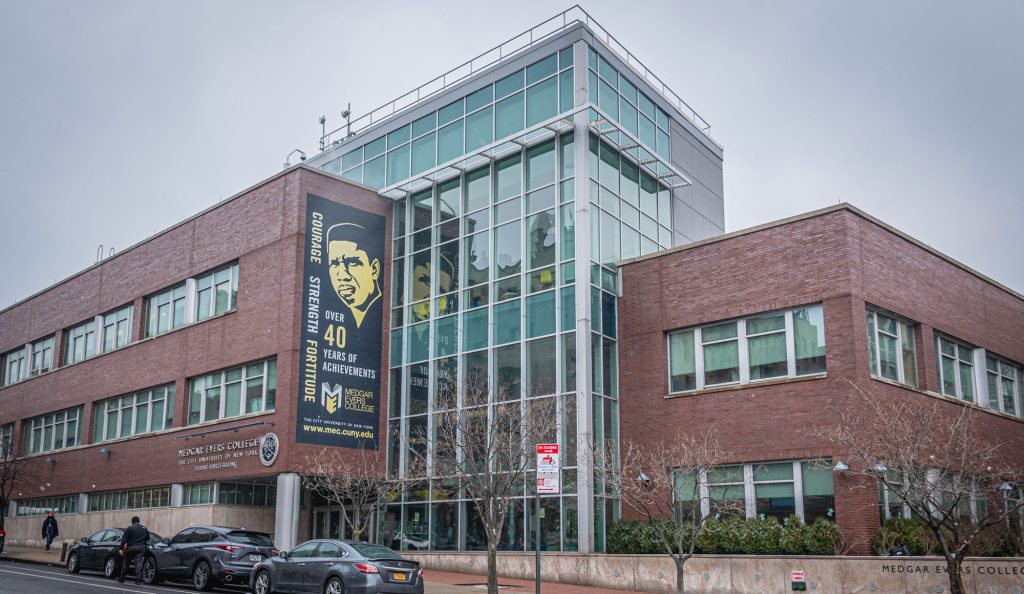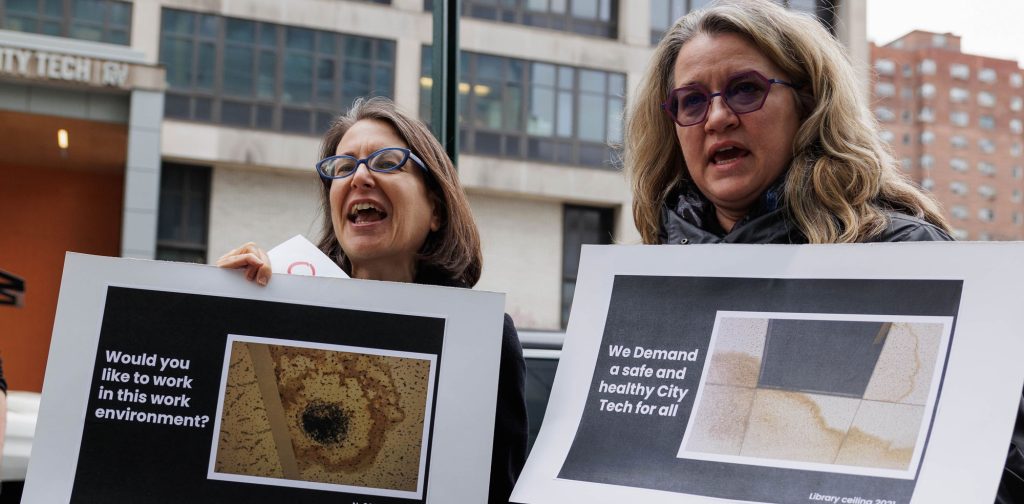
Mariana Regalado says the mold problems are citywide. (Credit: Dave Sanders)
Mold problems have been a concern for PSC health and safety activists for many years. The dilapidated conditions at CUNY campuses – a result of systematic disinvestment by the city and state combined with lackluster action from the University administration – have made it possible for such dangerous problems to fester.
During the October 21 CUNY Board of Trustees hearing at John Jay College, PSC library activists spoke out about the many instances of mold in the libraries.
Medgar Evers
I am speaking now on behalf of Medgar Evers College Library faculty and staff who are dealing with such a crisis in their library that they cannot take time away to be here to deliver this testimony.
Since 2014, when we moved into our beautiful, renovated library, we have experienced damage throughout the library due to multiple leaks and floods caused by rain, improper drainage and faulty pipes. Then, in 2021, Hurricane Ida flooded the whole lower level, and library faculty and staff were forced to work remotely for over a semester while the library was being repaired. Many of our library and archival holdings were damaged.
In the spring of 2022, the staff of the archives were moved out of the archives area because of a black mold outbreak. Sometime in the fall of 2022, the HVAC system was upgraded. After that, humidity levels actually went up, and temperatures could not be controlled.
In August 2023, there was a mold outbreak in the Technical Services area, where cataloging and new book processing takes place. Books, archival materials and chairs were affected. Library faculty and staff members had to be evacuated from that area.
SPREADING
In the spring of 2024, a crew from DASNY [Dormitory Authority of the State of New York] came in to do mold abatement on the books and archival materials in the Technical Services area. They cleaned the materials. But since then, mold has spread on all three floors of the library. Laptop bags, chairs, desks and personal belongings at other locations and people’s offices in the library are moldy as well.
Some of the newly acquired books that were stored in the chief librarian’s conference room for two months are covered with mold. Facilities may have discarded the books without consulting us. There is a library procedure for deleting books from the catalog before discarding them. This information was communicated to Facilities, but it has been disregarded.
There is so much moisture in the air that Facilities placed dehumidifiers in several areas including the archives. The dehumidifiers are constantly on, and their tanks need to be emptied several times a day.

Medgar Evers College is a major site of outbreaks, according to members. (Credit: Erik McGregor)
Mold has spread to the book stacks on the lower level of the library. But this is not the only problem there. There have been no lights in the area for years, and staff and patrons need to use flashlights to be able to read call numbers. Mold has also spread to the reserved textbooks collection on the main floor.
WORSENING
The vinyl seats of the student chairs throughout the library have deteriorated excessively from the climate conditions.
The administration has not been communicating with anyone in the library about how things are being resolved. No one deals with our complaints properly. For example, we were told that the suspicious stuff on the table in the chief librarian’s office is bacteria from food, though the office has been vacant for over a year because we don’t have a chief librarian, and no one has been in there.
We still have no chief librarian, having only interim chiefs since 2016, and no chief for the past year. Library faculty have not been replaced. We are down from nine to five library faculty; we have no acquisitions librarian, no cataloging librarian, no evening/weekend librarian and one reference librarian was not replaced. We also haven’t been able to replace any retired COA/CLT/HEO staff. We had to reduce library hours.
Overall, the current administration’s attitude toward the library staff has been dismissive and/or punitive. We are told that we have been complaining too much. The measures they take are cosmetic and do not address the causes of the situation: Simply wiping the affected surfaces or painting over them does not resolve the issue. Library faculty and staff are all worried about the effects of mold in our work environment on our health.
Frans Albarillo
Brooklyn College
City Tech
We have a mold and staffing crisis that campus administrators, President Russell Hotzler and Provost Pamela Brown have failed to address or even fully acknowledge.
In August 2024, part of the library – including institutional archives and special collections, a classroom and three faculty offices – had to be closed and vacated because it is full of mold. I moved out of my office of nine years and had to discard personal books, clothes and student artwork that were covered in mold. These spaces are unsafe to use or inhabit. Institutional records continue to deteriorate, including a rare science fiction collection and ophthalmology collection that is essential for accreditation of a unique vision-care technology program.

Members protest the mold issues at City Tech in downtown Brooklyn. (Credit: Paul Frangipane)
We started systematically collecting documentation of mold, leaks, ceiling collapses and temperatures regularly exceeding 80 degrees in 2017. However, facilities issues, including decades-long noncompliance with ADA standards, long predate this.
OVERTAKEN
People entering spaces overtaken by mold, even for short assessment walk-throughs, have reported difficulty breathing, headaches, eye and skin irritation and sinus pain. Campus administration and our designated environmental health and safety officer, Luis Venegas, have tentatively agreed to clean the most affected uninhabitable spaces, but maintain that there is no mold and do not support mold remediation or testing.
The City Tech library also faces a dire staffing crisis and struggles to provide core services and keep desks staffed. We have only nine full-time librarians and two adjuncts to support more than 15,000 students. We have two tech workers to manage all library technology, an e-classroom, tech help desk and computer labs.
City Tech administration does not care about the physical health of workers and students. They don’t care whether students have safe environments in which to study, ADA-accessible facilities or minimal support services to succeed in college. They are even unwilling to acknowledge the basic reality of the conditions of the library.
City Tech library workers demand that campus administrators openly acknowledge the presence of mold and account for the literal toxic conditions of the physical plant and the human impact of their neglect. We demand professional testing and remediation of moldy areas. We demand open and frozen lines be filled and are concerned that the severity of the staffing crisis will impact our upcoming Middle States accreditation. We implore the Board of Trustees to intervene in the interest of current and future students, faculty and staff at City Tech.
Nora Almeida
City Tech
CCNY
I am speaking today in place of my colleagues in the City College Library who cannot take time away from their jobs to deliver this testimony.
On August 28, staff in the Cohen Library discovered mold on a number of library books. In the past there have been issues with mold in this library, usually due to leaking infrastructure.
But this fall the mold is different. We are now experiencing a mold infestation.
We initially thought it was caused by damp air coming out of HVAC blowers in the library. And yet it has not been possible to isolate the mold to these areas near the blowers alone. The mold-affected books are located in scattered clusters in sections of shelves. There are not clear patterns to explain the areas where the mold is currently growing. It has been difficult to tape off or mark the affected areas and warn patrons of the shelves which we know to have mold. We are concerned for our students who go into these sections of the library.
We will need to assess which books can or cannot be saved from these mold outbreaks. The loss of books that will be discarded compounds because our library budgets remain stagnant and do not include extra funds or allocations for replacing moldy books. It is also likely that many of the books will be impossible to replace. This work to assess, potentially replace, clean, sequester and arrange damaged books demands library faculty and staff hours that we do not have. After years of understaffing and underfunding our libraries, time devoted to managing this mold robs time away from our other library duties and diminishes the time we have to provide direct support for CUNY researchers.
STUDENTS SPEAK OUT
Our students have complained about this issue to the City College president. We have had many meetings with Health and Safety and Facilities. Facilities has cleaned some of the books, but we are not certain that such cleaning is effective for the mold outbreak we have. We’ve seen cleaning and recleaning of the same spaces, which implies that cleaning alone will not solve this problem. We were told by our health and safety officer that the air in the library was tested, but we cannot see the results of these tests. He claimed that the humidity levels were safe for books, but the amount of mold we have found shows otherwise.
There were some upgrades made to the HVAC system back in 2022–2023, and since then the air has not been the same. Many of us have had respiratory issues over the years; we don’t want to get sicker.
We have immediate demands for a fleet of industrial dehumidifiers until the HVAC system can be assessed. We are using gloves and masks to handle books in our collection, but we will need additional supplies if this situation continues. We would like further testing and diagnosis of the issues to be done by a professional mold remediation company. We would like assistance from trained professionals to assess the affected collections, and for a systematic way that environmental issues could be addressed throughout CUNY instead of being swept under the rug – or taped off and left to bloom into a larger problem.
Alycia Sellie
Graduate Center
CUNY-wide
CUNY has acknowledged that only 8% of its buildings are in good repair. We understand that building conditions are not fixed overnight. Yet the mold situation in these libraries is not only a resource problem or a building problem, it is also a policy problem with the way our libraries are managed on our campuses.
Mold is a known threat to library collections everywhere, not just at CUNY. Mold spores live in the air, and print books – with their cloth bindings, adhesives and paper interiors – are very attractive to mold. Librarians and museum curators are professionally trained in basic conservation and preservation standards that are required to protect these materials. But CUNY’s chronically understaffed libraries cannot keep up under current conditions.
MANY FACTORS
It appears that mold was reactivated recently in several libraries because of a combination of factors:
- We had an unusually hot and humid stretch this summer.
- The energy savings program in NYC had some campuses running the HVAC a little lower than usual, with no special consideration for the requirements of library spaces.
- Recent upgrades to HVAC systems created new humidity issues that were not properly addressed.
- Many buildings were closed for Summer Fridays and on weekends, and we suspect the HVAC is shut off during those periods to cut costs.
The affected locations have been unable to maintain temperatures and relative humidity levels that we know will prevent mold growth. Shutting off the HVAC entirely creates conditions where inactive mold that has been improperly cleaned can be reactivated and begin to spread. So it is not surprising that librarians are seeing mold blooms during the summer months. What is surprising is the pushback they receive from their building engineers, campus facilities and local administration. We have heard some reports of humidity rising to 80% with indoor temperatures in the low 80s. Professional librarians know that you cannot sustain paper collections in these conditions. Worse, these are spaces where many students congregate, placing them at risk. Libraries are our most beloved and most heavily-used campus spaces and we should be dedicating resources to support their activities.
Mold remediation is very expensive. It is much cheaper to prevent mold blooms through proper maintenance of our spaces. But CUNY librarians have been ignored, dismissed and even blocked from managing our own collections. This is a structural problem:
- Some of these campuses have not had a chief librarian for years.
- Chief librarians are charged with administering the library facilities, but in practice most are at the mercy of their campus provost and have little say over the library as a space.
- The Central Office has no authority over campus practices for collections care or facilities maintenance.
- There is no dedicated funding line for CUNY library facilities and they are chronically understaffed.
RING THE ALARM
The librarians here today are sounding the alarm and asking the Board for help because no one else seems to be listening. We need a baseline funding level for libraries across all campuses. For the safety of our faculty, staff and students, and for the safety of our collections, we need a stable environment within set ranges of temperature and humidity. We need to maintain this stable environment at all of our campuses. And we need to staff the libraries with trained professionals who are given the necessary resources to do their jobs. Librarians have tried locally to make these corrections, but we cannot do it without centralized institutional support.
Mariana Regalado
Brooklyn College
Published: December 20, 2024

